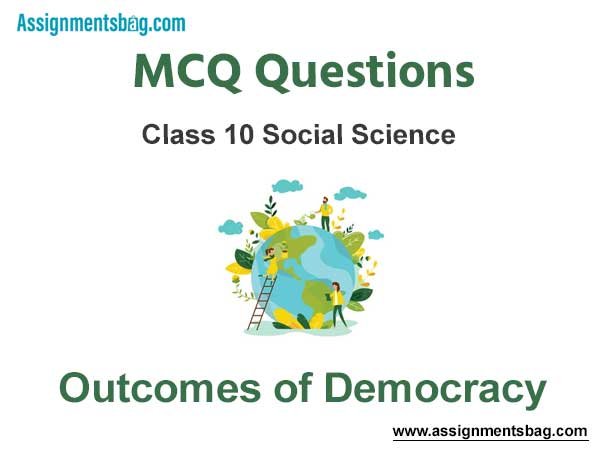Please refer to MCQ Questions Chapter 7 Outcomes of Democracy Class 10 Social Science with answers provided below. These multiple-choice questions have been developed based on the latest NCERT book for class 10 Social Science issued for the current academic year. We have provided MCQ Questions for Class 10 Social Science for all chapters on our website. Students should learn the objective based questions for Chapter 7 Outcomes of Democracy in Class 10 Social Science provided below to get more marks in exams.
Chapter 7 Outcomes of Democracy MCQ Questions
Please refer to the following Chapter 7 Outcomes of Democracy MCQ Questions Class 10 Social Science with solutions for all important topics in the chapter.
MCQ Questions Answers for Chapter 7 Outcomes of Democracy Class 10 Social Science
Question. Most democracies have failed on which of the following issues?
(a) Corruption
(b) Removal of poverty
(c) Political equality
(d) Both (a) and (b)
Answer
D
Question. More than half of population of which country lives in poverty?
(a) India
(b) Bangladesh
(c) Sri Lanka
(d) All of the above
Answer
B
Question. Which of the following statement is against the spirit of democracy?
(a) Democracy promotes equality among citizens
(b) It enhances the dignity of the individual
(c) It does not allow room to correct mistakes
(d) It provides method to resolve conflicts
Answer
C
Question. In actual life, democracies do not appear to be very successful in:
(a) Reducing economic inequalities
(b) Maintaining dignity of each individual
(c) Ensuring equality to all
(d) All of the above
Answer
A
Question. Democracies are based on:
(a) Social equality
(b) Economic equality
(c) Political equality
(d) All of these
Answer
C
Question. How many countries of the world today claim and practice some kind of democratic politics? Choose the correct option from the following ones:
(a) Over 80 countries
(b) Over a hundred countries
(c) Over two hundred countries
(d) Only (a) is correct option
Answer
B
Question. Which of the following factors is often missing from a non-democratic government?
(a) Accountability
(b) Responsibility
(c) Transparency
(d) All of these
Ans. (d) All of these
Answer
D
Question. On which of the following pair of factors,economic development does not depend?
(a) Country’s population size and global situation
(b) Cooperation from other countries and country’s economic priorities
(c) Global situation and resources available in the country
(d) Both (a) and (b)
Answer
C
Question. In the context of assessing democracy which among the following is the odd one out. Democracies needs to ensure:
(a) Free and fair election
(b) Dignity of the individual
(c) Majority rule
(d) Equal treatment before law
Answer
C
Question. Which of the following features is NOT associated with a democratic government?
(a) Democracy is based on the idea of deliberation and negotiation
(b) There is transparency in decisionmaking.
(c) Decisions are taken quickly and are often forced upon people
(d) None of the above
Answer
C
Question. Which of the following outcome of democracy cannot be ignored?
(a) Democracy’s ability to generate its own support
(b) Democracy often frustrates the needs of the people
(c) Democracy often ignores the demands of a majority of its population
(d) All of the above
Answer
A
Question. Which one of the following option best signifies this cartoon?
(a) Demand for separate state from Democratic Government
(b) Democratic Government is facing territorial issues with the bordering states
(c) Democratic Government is coping with multiple pressures through accommodation
(d) Democratic Government accepts demands based on separate state
Answer
C
Correct and Re-write/ True-False
Question. Democracies are based on social prosperity.
Answer
Democracies are based on political equality.
Question. Democratic governments have a very good record when it comes to sharing information with citizens.
Answer
Democratic governments do not have a very good record when it comes to sharing information with citizens.
Question. Dictatorships are based on political equality.
Answer
Democracies are based on political equality.
Fill in the Blanks
Question. The passion for …………………… and …………………… are the basis of democracy.
Answer
respect, freedom
Question. Democracy transforms people from the status of a subject into that of a ………………….. .
Answer
Citizen
Question. Ability to handle social differences, divisions and conflicts is a plus point of ……………………….. .
Answer
Democratic regimes
Question. Complete the following statement:Democracy remains democracy only as long as every citizen has a chance of being in …………………… at some point of time.
Answer
Majority
Assertion-Reason (A-R)
In each of following questions, a statemant of Assertion (A) is given followed by a corresponding statement of Reason (R). Select the correct answer to codes (a), (b) (c) or (d) as given below:
(a) Both (A) and (R) are true and (R) is the correct explanation of (A).
(b) Both (A) and (R) are true but (R) is not the correct explanation of (A).
(c) (A) is correct but (R) is wrong.
(d) (A) is wrong but (R) is correct.
Question. Assertion (A) : Democracy is a legitimate government.
Reason (R) : Regular, free and fair elections are the spirit of democracy.
Answer
A

We hope you liked the above provided MCQ Questions Chapter 7 Outcomes of Democracy Class 10 Social Science with solutions. If you have any questions please ask us in the comments box below.


